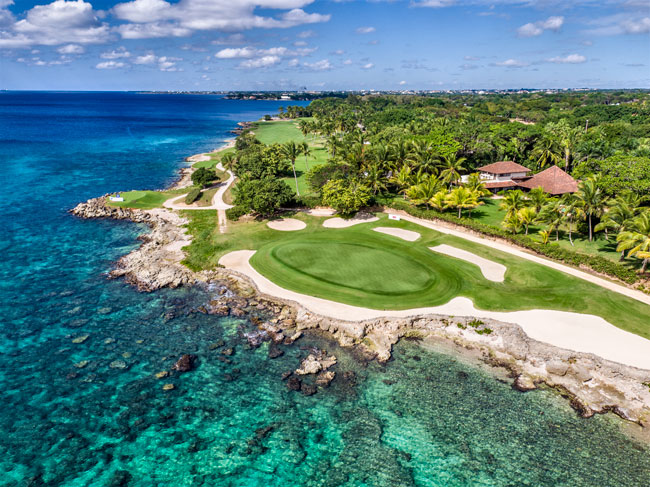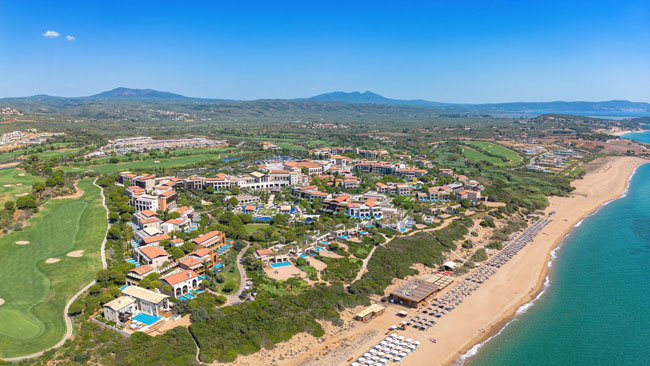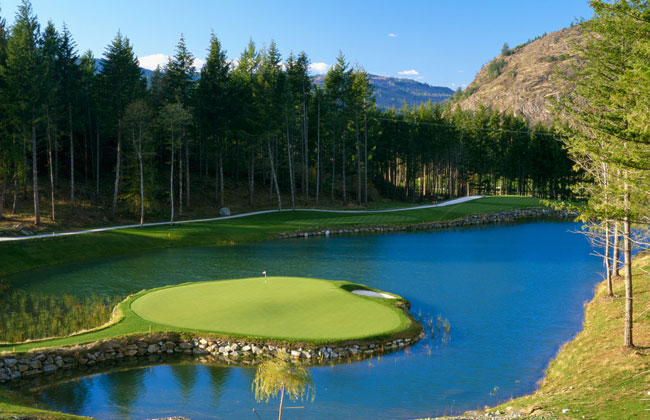Gone are the days when golf was simply a game for the green-sport elite. Today, golf courses have evolved far beyond that, becoming the beating heart of integrated resort-style townships where luxury living, holistic wellness, and long-term investment strategies converge. In this shifting landscape, two powerful trends are shaping the future of global golf real estate: branded residences and golf-integrated retirement communities.

Teeth of the Dog Golf Course at Casa de Campo, Dominica Republics
Branded Golf Residences – A New Benchmark for Luxury Living
No longer just places to live, branded golf residences now symbolise a highly personalised, refined lifestyle with world-class services. Names like Four Seasons, Banyan Tree, Ritz-Carlton, and Mandarin Oriental no longer exist solely in the hotel sphere, they’ve entered the residential realm, bringing with them five-star service philosophies and global prestige.
At Costa Navarino in Greece, Mandarin Oriental-branded villas are nestled among olive groves and elite European golf courses. Villa owners enjoy not only serene natural surroundings but also private butler service, hotel-standard concierge care, and exclusive access to facilities such as spas, mineral pool, and Michelin-starred restaurant.
In Asia, the model is rapidly expanding. At Laguna Phuket in Thailand, home to an 18-hole golf course, an integrated resort, and luxury residences, owners of Banyan Tree Residences live within the heart of a resort, benefitting from both rental income during tourism peak seasons and a luxurious lifestyle. This setup is particularly appealing to international investors, offering strong returns and increasing property value associated with the prestige of global brands.

Costa Navarino Golf Course, Greece
Where Golf Meets Brand – More Than Just Architecture
Beyond elegant design and prime locations, the real value of branded golf residences lies in their community, where residents are not merely buying a home but joining an exclusive lifestyle ecosystem. Golf clubs, regular tournaments, fine dining events, wellness retreats, and even art workshops collectively shape a sophisticated social life.
At Bear Mountain in British Columbia, Canada, homes surrounding the Mountain Course designed by Jack Nicklaus serve not only as weekend getaways but also long-term residences for nature lovers and those with discerning lifestyles. Residents enjoy a closed-loop ecosystem of a five-star resort, sports centre, hiking trails, and a community united by eco-conscious and high-quality living standards.

Moutain Golf Course at Bear Mountain Resort, Canada
It’s no exaggeration to say that branded golf real estate is setting a new standard: where property is no longer just about physical assets, but about living experiences, personal style, social status, and being part of a refined financial strategy.
Golf Retirement Communities – The Ideal Model for Active Aging
Beyond wealthy middle-aged homeowners, a new demographic is quietly powering the rise of golf-centric communities: the modern, active senior who values well-being and wants to make the most of every day.
Worldwide, the retirement community trend has increasingly merged with golf, creating living spaces for older adults that feel anything but aged. These are not nursing homes, but resort-style environments where seniors live independently with access to support services as needed, from healthcare and dining to sports and cultural activities.
At The Villages, one of the largest retirement communities in the United States, residents aged 55 and up enjoy access to 50 golf courses, personal electric carts, dance clubs, spas, yoga classes, and even a live theatre. This model is expanding to Canada, Australia, and more recently to Thailand and Indonesia where warm-weather destinations are favoured by global retirees.
Golf, with its cardiovascular, respiratory, and mental health benefits, naturally aligns with the philosophy of active aging. Combined with single-storey homes, barrier-free design, clean air, and on-site wellness services, golf residential communities are becoming the “ideal retirement destinations of the 21st century.”
Vietnam’s Readiness for a New Generation of Communities
With its favourable climate, natural beauty, and competitive living costs, Vietnam holds enormous potential for developing branded golf residences and retirement communities. Suburban regions such as Nui Coc Lake, Lang Co, Ho Tram, and Dong Nai are poised to become emerging destinations for this trend — places where international residents or domestic retirees can “live slowly” without boredom.
If integrated with 9 or 18-hole golf courses, healthcare facilities, spas, art spaces, and internationally managed services, these developments will be more than just property projects. They will respond to genuine market needs and offer long-term, sustainable growth.
Golf — Where the Past, Present, and Future Meet
Once a symbol of European aristocracy, golf has now become a global icon of a lifestyle that is refined yet unpretentious, private yet connected, investment-driven yet deeply inspiring.
When placed at the heart of branded real estate or next-generation retirement communities, golf offers not only financial value but also becomes the catalyst for a lifestyle — one that is green, healthy, and deeply fulfilling.
A swing amidst the pine forests of Canada, afternoon tea by the fairways of Algarve, or a morning walk along the grass in Lang Co, these are not just fleeting moments, but gentle reminders that: “Life can slow down, but never fade away.”
Trang Duong
Co-founder of Rubix International
Expert in hotel development and management